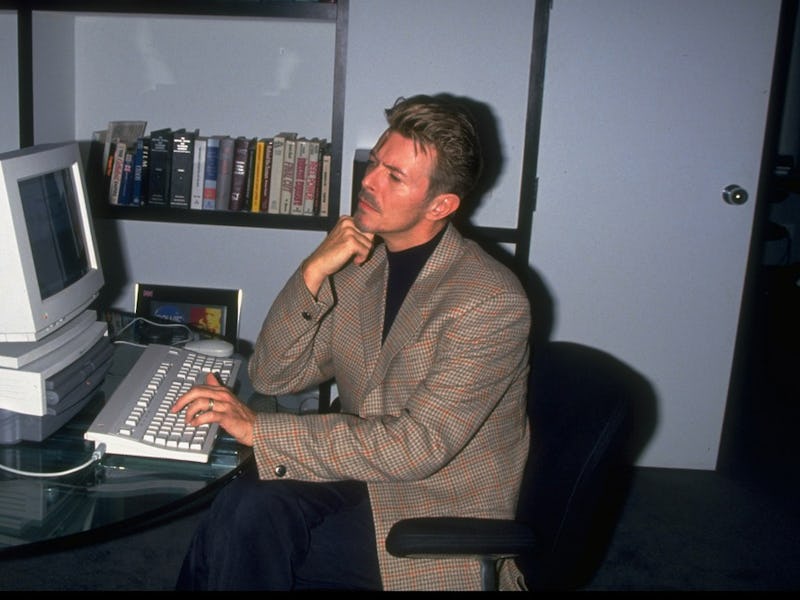David Bowie Was an Internet Pioneer and Rock's Greatest Futurist
The Thin White Duke's forays into technology were as far ahead of their time as his art.

The world mourned Sunday night at the news of the passing of legendary singer, songwriter, actor, producer, artist, fashion icon, David Bowie. Forever a visionary, Bowie always innovated artistically, and it should be no surprise that he took the same forward-thinking approach to technology as he took to music.
Now, it should be pointed out that most of Bowie’s internet ventures were far from successful, but that was perhaps more a function of his being a decade or so ahead of the rest of us. For instance, Bowie was one of the first artists to make his music available via online download. In 1996, more than 375,000 fans downloaded tracks from davidbowie.com. To put that in perspective, less than 30 percent of households in the U.S. had internet access, there were only about 100,000 websites total on the World Wide Web, and the fastest download speeds available were between 28.8 Kbps to 33.6 Kbps (the 56.6 Kbps modem didn’t debut until 1997). That’s a lot of people spending a lot of (possibly metered) time online watching tiny status meters and waiting for Bowie to fill their hard drives.
A year later, Bowie had the wild idea to issue bonds against his future musical earnings. Bowie Bonds were like a traditional asset-backed security, but in this case, the assets in question were Bowie’s intellectual property — namely the rights to all songs Bowie recorded before 1990. With an average life of 10 years, the bonds paid a healthy 7.9 percent interest (U.S. Treasury notes were paying about 6.39 percent at the time). While it meant Bowie would have to forfeit royalties, for the next 10 years, it raised over $55 million dollars.
The Thin White Duke then rolled his Bowie Bond windfall into a new project: his own internet service provider. Debuting in North America and Great Britain in 1998, BowieNet was part dial-up ISP, part online fan-club, and part social media network. For $19.95 per month, BowieNet provided users with web access and all sorts of cutting-edge bells and whistles, such as a news ticker, sports scores, stock prices, weather updates, a personalized BowieNet email address, and a whopping 5MB of space in which they could create their own personalized homepage (for you youngsters out there, in 1998 having your own customizable homepage was pretty hot shit).
In addition, for a small fee, users could upgrade to a premium subscription that would give them access to chatrooms and message boards (on which the Duke himself would be popping in and out), premium software (like one of the internet’s first interactive, Flash-based mp3 players), and most importantly unprecedented access to Ziggy himself. The site would go on to feature archived RealPlayer videos of full-length concerts, exclusive tracks (on occasion even live studio recordings), regular chat sessions with the Duke and his celebrity friends, and even one of the internet’s first live-streamed recording sessions in 1999. BowieNet got out of the ISP game in 2006, but remained active as a social-network styled fan-site until 2012.
Not satisfied merely competing with companies like NetZero and AOL, Bowie launched his very own Bowie-branded online bank in 1999. Indeed, you read that correctly: Signing up with BowieBanc got depositors their own Bowie-edition ATM cards and checks, and of course, a free year subscription to the BowieNet ISP as a thank you gift. While Bowie’s name and likeness were all over the user’s side, the bank itself was actually USABancshares.com, the new online branch of BankPhiladelphia. At the time, a rock-star themed online bank didn’t quite get the reception investors had in mind, but again, that may have just been the Duke being ever ahead of the curve.
By 2000, only 11 million people in the U.S. had ever even attempted to use online banking in any capacity. Keep in mind, BowieBanc debuted more than a decade before PayPal became the most trusted name in online payment processing, and a certain celebrity mogul made a fortune hawking less-than-secure online-based pre-paid Visa cards.
In 2000, Bowie sat down for a now legendary interview with BBC presenter Jeremy Paxman in which he made some pretty bold predictions for the future of the internet. He believed the internet would take power away from record labels and create a more interactive community between musicians and fans; that the internet would turn music into a more audience-centric art. And though the change the internet brought to music would ultimately tank music sales in the 2000s, and subsequently be responsible for downgrading Bowie Bonds to junk bond status (making Bowie’s $55 million advance seem all the more impressive and shrewd), he was very bullish on the future of the internet as a whole:
“I don’t even think we’ve seen the tip of the iceberg. I think the potential of what the internet is going to do to society, both good and bad, is unimaginable. I think we’re on the cusp of something exhilarating and terrifying … It’s going to crush our ideas about what mediums are all about.”
Rarely have we seen a more transcendent figure than David Bowie; he was bigger than any song he ever sung, any role he ever played, any picture he ever painted. As we spend the upcoming days and weeks saying farewell to the Thin White Duke, let’s salute his sage and prescient vision, not only for his art, but as rock ‘n’ roll’s preeminent internet futurist.